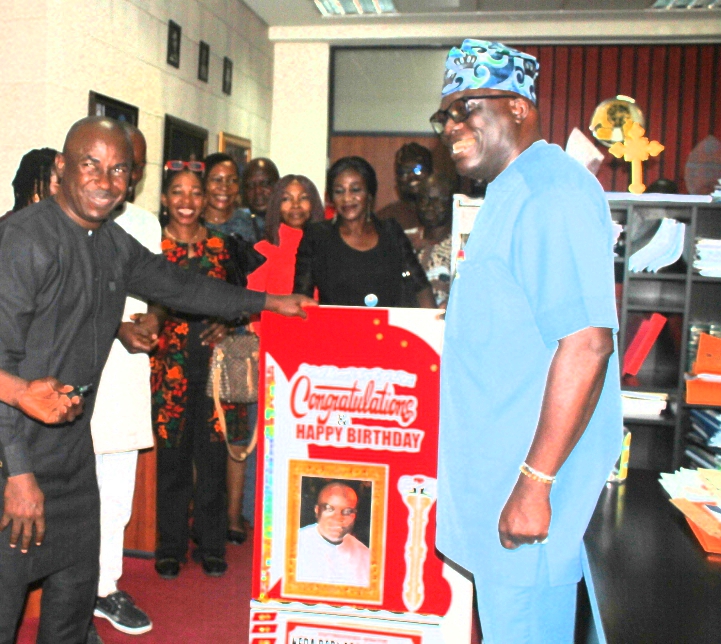Stakeholders has commended Dr Omoniyi Ibietan, the Author of book “Cyber Politics: Social Media, Social Demography and Voting Behaviour in Nigeria” who is also the Head, Social Media unir of Nigerian Communications Commission NCC.
At the special Book Reading and Further Reviews of the book held at the University of Ibadan on 19th April 2024,stakeholders which included the Executive Vice Chairman/CEO, Nigerian Communications Commission NCC,Dr Aminu Maida who delivered a goodwill message titled”Cyberpolitics and the Re-engineering of Political Communication in Africa”said Dr.Omoniyi’s book is an absorbing and persuasive scholar work that added huge insightful value to an understanding of the interactions between politics, social media networks and other variables that influenced the behaviour of voters in a democracy.
Other Stakeholders further praised the Author for giving insights to the roles being played by digital platforms for the sustainability of Nigeria’s democracy most especially election year.
The other Stakeholders Goodwill messages read in full;
Remarks by Prof.Umaru A. Pate on Dr Omoniyi Ibietan’s Book On Cyber Politics In Nigeria
On behalf of the Communication Studies family and specifically the Association of Communication Scholars and Professionals of Nigeria (ACSPN), I congratulate Dr Omoniyi Ibietan on the successful publication and presentation of his book on cyber politics in Nigeria.
As an active member of the ACSPN, I am glad that he is in the frontline of promoting some of the Association’s objectives of promoting innovative communication education through publications and other knowledge sharing platforms.
Without a doubt, the academic community and communication scholarship require a deeper understanding of the evolving trend, influence, and impact of cyber politics in the country. I am glad Dr. Ibietan has been able to undertake intensive and extensive research in the area. Happily, the study has been transformed into a textbook for wider circulation.
A cursory reading of the book indicates that the author has been able to achieve the objectives of contributing to the conceptual and empirical dimensions of the subject in the context of political communication.
Personally, I am enriched by the arguments and conclusions in the book. The book has increased my understanding of the relationship between the ever-growing social media and politics in the country. This is very important for obvious reasons, some of which relate to the popularity and influence of the new media, particularly among the most active components of the population.
While welcoming the book as a positive addition to the growing body of literature in the area especially as it gives the Nigerian context, I am strongly recommending it as a worthy book for all students of communication studies, political science and allied fields. Our political tacticians and gladiators and other scholars of the interface between society and information and communication technologies will find the text appropriate and generously useful in helping them to deeply understand the strategies and impact of the social media in Nigerian politics.
Definitely, the author’s effort is clearly manifested in the quality of the content in the book, its appropriate theoretical grounding, and sound conclusions that are reliably valid in the Nigerian context.
Once again, I congratulate Dr. Ibietan and enjoins interested individuals to get copies of the book for increased understanding of the relationship between social media and politics in Nigeria.
Thank you
Umaru A. Pate
Professor of Media and Society;
President, Association of Communication Scholars and Professionals of Nigeria (ACSPN);
Vice Chancellor, Federal University, Kashere, Gombe State.
April 19, 2024
Remarks by Prof. Peter Esuh at Dr. Omoniyi ibietan’s special book of reading
Dr. Omoniyi Ibietan’s book Cyber Politics: Social Media, Social Demography, and Voting Behaviour stands out among the numerous publications on strategic communication in contemporary times. It offers a scholarly exploration of how social media platforms shape electoral behaviour in the intricate Nigerian electoral landscape. This book is a significant addition to the ongoing discourse on the influence of technological advancements on societal progress.
The book proposes the Channel-Factor Model of Communication. This model articulates the key influences and variables that impact effective communication in a political and socio-economic environment. The book clarifies the role of changing population dynamics in the developed and developing world and its implications for social media utilization in bringing about political change. These demographic trends’ impact on society and adopting new and innovative technologies imply broader political, social, and economic imperatives for all nation-states.
It is well-known that technological innovation redesigns the global geopolitical and socio-economic landscape while enabling unfettered access to information and possibilities in real-time. While the internet and, by extension, communication platforms have provided the foundation for most of these possibilities, it is essential to be conscious of the potential impact of other emerging technologies such as Artificial Intelligence (AI), Augmented Reality (AR), Internet of Things (IoT), Robotics, Big Data, Block Chain and Advanced Analytics on societal trends. Important foundational lessons can be learned from the impact of social media on societal outcomes, as demonstrated by Dr. Ibietan’s book.
The author, Dr. Omoniyi Ibietan, is a renowned scholar known for his intellectual prowess and activism. His work has consistently been commendable, and this notable Book of Reading is a testament to his innovative thinking and scholarly contributions. The book is wholeheartedly endorsed for reading.
Prof. Peter Esuh
Dean, Faculty of Communication and Media Studies ,
University of Uyo
Excerpt from the first review of Cyber Politics – Social Media, Social Demography and Voting Behaviour in Nigeria, at the public presentation in Abuja on July 25, 2023 by Azu Ishiekwene, journalist of over 35 years and Editor-In-Chief of LEADERSHIP
“In parts of Cyber Politics, but in far greater detail in Chapters One, Five and Six, the author not only examines earlier studies on the impact of social factors, including peer, opinion leader and family influences on voter behaviour, he also sets out the broad objectives of the book, raising issues that are both specific and contemporaneous in value.
“In other words, instead of leaving the reader wondering what happened on the streets of North Carolina in Lazarsfeld’s studies decades ago and how that affects him in Gwagwalada, Abuja, Cyber Politics uses Nigeria’s 2015 general elections as anchor.
“It explores, among other things, the question of whether political conversations amongst Nigeria’s estimated 33 million active social media users, especially the influencers as of 2021 had any significant impact on the outcome of the 2015 election…
“Cyber Politics helps me as a voter to ponder if the social networks I belong to or the influencers I follow have any potential effects on my political behaviour either in terms of mobilisation or my actual voting decisions. Sometimes we think we’re our own man, until we realise, like Pavlov’s dog, that someone somewhere might be pulling the strings.”
The text is available online at: www.azuishiekwene.com
*Ibietan: A testimonial on scholarship and commitment,By Prof. Abiodun Salawu
I had the privilege of supervising the PhD thesis from which this book by Dr. Omoniyi Ibietan emanated.
It was a pleasure supervising Omoniyi’s thesis as he was very conversant with the literature of the study. I must say that I learnt from the literature he used.
Another of his strength was that he was able to do effective academic writing. This made reading his work not tortuous but exhilarating.
He was dedicated to the work that he took a year leave from his place of work to come over to Mahikeng in South Africa to exclusively focus on the study. I can say that the study was effectively done within this one year.
With the thesis turned into a book, I believe the ideas, findings and recommendations contained therein are now made available to a wider readership.
Congratulations to the author.
Prof. Abiodun Salawu
North-West University, South Africa.
(Salawu supervised Omoniyi Ibietan’s doctoral thesis in North-West University, South Africa)






